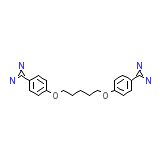Pentamidine




Pentamidine Brand names, Pentamidine Analogs
Pentamidine Brand Names Mixture
- No information avaliable
Pentamidine Chemical_Formula
C19H24N4O2
Pentamidine RX_link
http://www.rxlist.com/cgi/generic3/pentam.htm
Pentamidine fda sheet
Pentamidine msds (material safety sheet)
Pentamidine Synthesis Reference
No information avaliable
Pentamidine Molecular Weight
340.42 g/mol
Pentamidine Melting Point
186.0 oC (decomposes)
Pentamidine H2O Solubility
Complete
Pentamidine State
Solid
Pentamidine LogP
3.28
Pentamidine Dosage Forms
Powder for solution
Pentamidine Indication
For the treatment of pneumonia due to Pneumocystis carinii.
Pentamidine Pharmacology
Pentamidine is an antiprotozoal agent. It is an aromatic diamidine, and is known to have activity against Pneumocystis carinii. The exact nature of its antiprotozoal action is unknown. in vitro studies with mammalian tissues and the protozoan Crithidia oncopelti indicate that the drug interferes with nuclear metabolism producing inhibition of the synthesis of DNA, RNA, phospholipids and proteins. Little is known about the drug's pharmacokinetics. The medication is also useful in Leishmaniasis and in prophylaxis against sleeping sickness caused by Trypanosoma brucei gambiense. Hydration before treatment lessens the incidence and severity of side effects, which include liver or kidney dysfunction, hypertension, hypotension, hypoglycemia, hypocalemia, leukopenia, thrombcytopenia, anemia, and allergic reaction. It is generally well-tolerated.
Pentamidine Absorption
Absorbed poorly through the gastrointestinal tract and is usually administered parenterally.
Pentamidine side effects and Toxicity
Symptoms of overdose include pain, nausea, anorexia, hypotension, fever, rash, bad taste in mouth, confusion/hallucinations, dizziness, and diarrhea.
Pentamidine Patient Information
No information avaliable
Pentamidine Organisms Affected
Pneumocystis carinii














